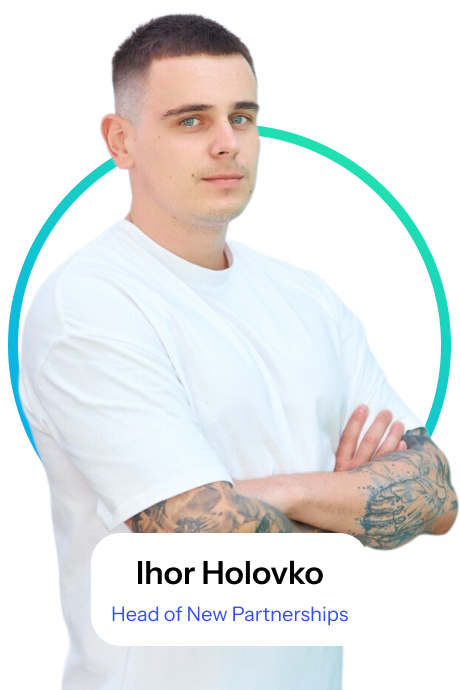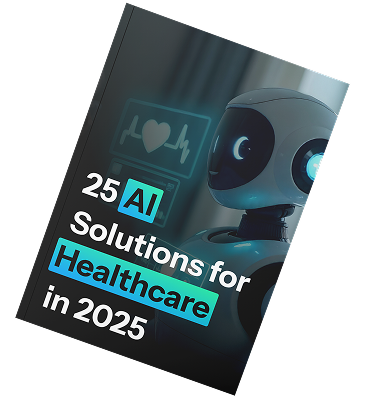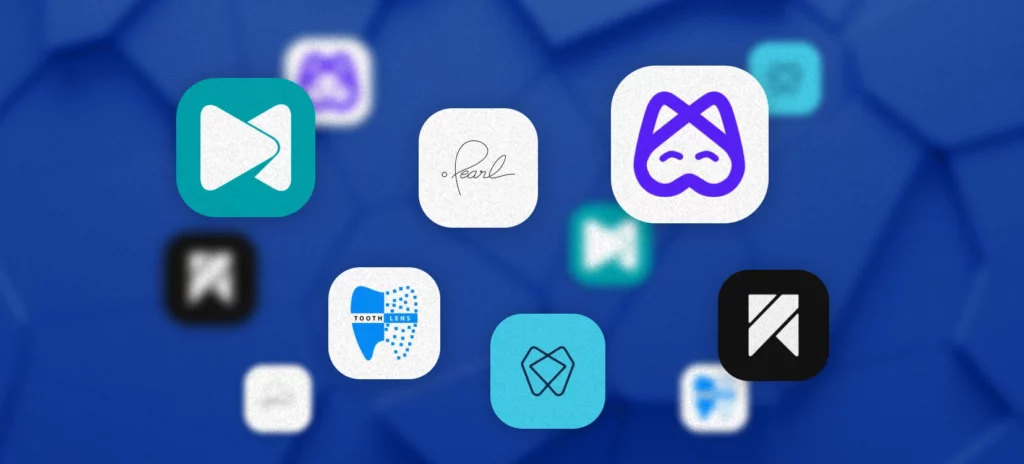Generative AI in Healthcare: Use Cases, Real-World Applications, and Emerging Startups
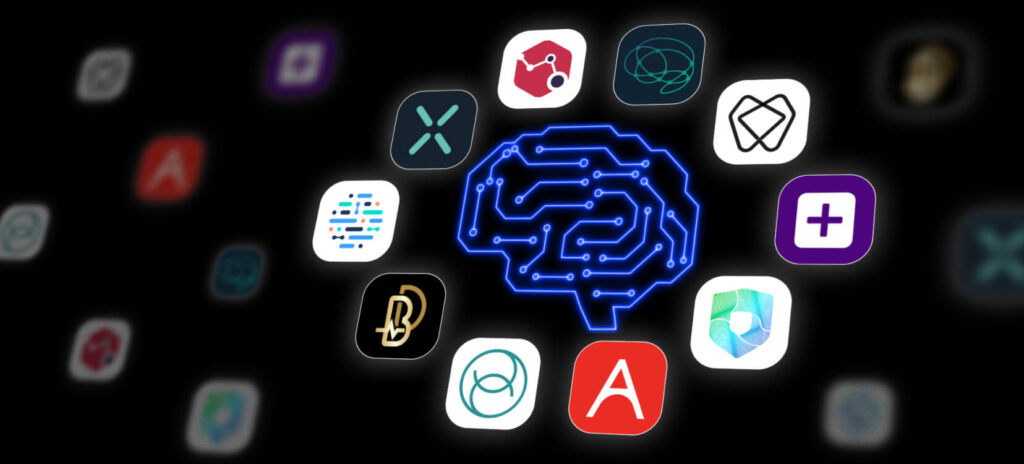
AI is changing every industry, but its promise and complexity are no more apparent than in healthcare.
According to the Deloitte Center for Health Solutions, 75% of top health care companies are experimenting with or planning to scale Generative AI across the enterprise.
As innovations move fast, Generative AI (GenAI) is emerging as the most exciting one.
At its core, generative AI is advanced AI that can create original, meaningful content from vast historical datasets like text, images, patient records, and lab results, potentially changing how healthcare professionals practice medicine. In this article, we’ll cover:
- How and where generative AI is being used in healthcare
- The real impact that AI is having on patient outcomes
- Real-world examples and use cases of generative AI solutions for healthcare
- Emerging Gen AI startups in healthcare
- How Riseapps can help with the development and enhancement of generative AI solutions.
Where and How is Generative AI Used in Healthcare?
Generative AI in healthcare can definitely help in these ten areas:
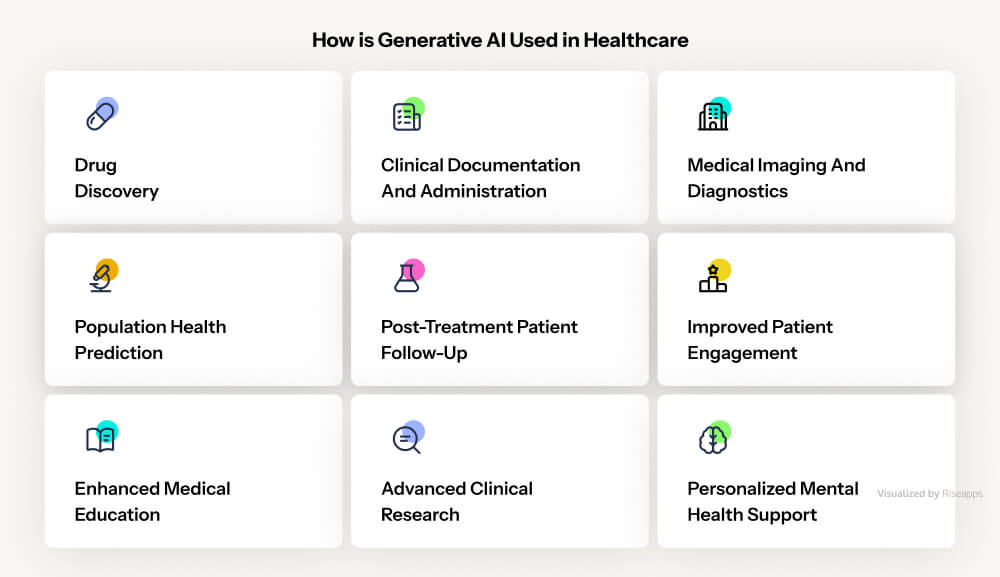
1. Drug Discovery
Traditional drug development can take over a decade and billions of dollars before new treatments are available.
Generative AI speeds up this process by intelligently searching through existing chemical structures, biochemical pathways, clinical trials and safety profiles to design new, theoretically effective drug molecules.
Thanks to generative-AI-driven molecular modeling, over 70 drugs are already in trials. Companies like Insilico Medicine use generative algorithms to produce potential drug candidates for conditions ranging from cancer treatments to rare genetic disorders.
2. Clinical Documentation and Administration
Healthcare providers spend hours upon hours managing electronic health records (EHR), contributing to high clinician burnout rates. Generative AI solutions, integrated by Epic and Oracle Cerner, significantly reduce this burden.
These intelligent language models record doctor-patient conversations, automatically summarizing conversations and inputting key information into patient records.
AI-enabled drafting can greatly simplify administrative tasks like insurance preauthorization paperwork and patient communication.
3. Medical Imaging and Diagnostics
Gen AI makes imaging better by separating meaningful diagnostic signals from noise.
AI-powered imaging tools from startups like Subtle Medical can generate cleaner, clearer MRI and CT scans, improving physician confidence in diagnosis while using much less radiation.
Especially impressive is the ability of these systems to depict subtle anomalies earlier than human observation alone allows.
4. Population Health Prediction
Gen AI technology shines brightest in population health. AI algorithms trained on large EHR and wearable device data can predict health risks in large patient groups and intervene before problems become critical.
For example, generative AI-guided analytics can identify patients at high risk of heart attacks, strokes, and chronic conditions like diabetes for early prevention.
5. Post-Treatment Patient Follow-Up
Post-discharge patient adherence is notoriously poor. Generative AI, with widespread adoption of wearables and IoT health trackers, personalizes monitoring.
Devices provide real-time data to AI platforms that assess patient recovery and alert clinicians if intervention is needed, thereby minimizing hospital readmissions and improving overall treatment outcomes.
6. Improved Patient Engagement
Generative AI enables patient-centric communication in healthcare industry by being empathetic and compassionate, so patients find the responses engaging and relatable.
AI tools like Gridspace automate patient communication through phone calls, scheduling inquiries, reminders and real-time responses. So patient engagement is scalable 24/7 without burdening clinical staff.
By handling non-diagnostic patient interactions empathetically and efficiently, Gen AI in healthcare increases patient satisfaction and trust, so communication is safe, accurate and consistent with healthcare standards.
7. Enhanced Medical Education
Enhancing medical education at every level—that’s where generative AI tools like ChatGPT really stand out.
They can be adapted for use in undergraduate courses, postgraduate training and even continuing medical education (CME).
Interactive teaching methods, personalized learning experiences and innovative ways to share knowledge all contribute to better educational quality and learner engagement.
8. Advanced Clinical Research
Healthcare systems such as Unlearn.AI use generative AI to build virtual representations of patients, simulating how their health might respond to different treatments.
That enables healthcare providers to tailor treatment strategies, predict patient responses more accurately and streamline clinical trials.
In areas like hematology, this Gen AI technology helps healthcare sector estimate disease progression and treatment efficacy. That, in turn, informs clinical practice and decision-making.
9. Personalized Mental Health Support
Gen AI can transform mental health care by providing personalized, interactive and empathetic virtual therapy assistants.
These intelligent conversational agents can chat naturally with patients dealing with stress, anxiety and depression, offering targeted coping strategies, CBT exercises and emotional support tailored to the patient’s conversation and emotional cues.
They can also generate personalized assessments, detect subtle changes over time, and alert human clinicians of escalating mental health risks.
So they can intervene and care for individuals who might not have access to consistent mental health care.
How Generative AI Solutions Improve Patient Outcomes
Gen AI in healthcare improves patient outcomes through personalized care, accurate diagnostics, and proactive monitoring:
1. Accurate and Timely Diagnoses
Generative AI reduces errors from missed imaging anomalies or incomplete patient data.
Enhanced imaging and comprehensive patient data analysis mean timely and accurate diagnoses, which can be a matter of life and death for diseases like cancer, where early detection is everything.
Riseapps demonstrated this with our Black Doctor 24/7 platform. We integrated a clinically tested AI assistant, “Amina,” powered by Infermedica’s engine. Amina triages symptoms and accelerates the diagnostic process by 65%, resulting in faster and more accurate patient assessments. Over 30,000 African American men benefited from early hypertension and diabetes screening, reducing the risk of late-stage health complications.
2. Deeply Personalized Medical Care
AI-generated care plans based on individual patient history, genetic profile, and lifestyle data mean hyper-personalized healthcare.
Patients gain more understanding through AI-generated educational materials tailored to their condition and treatment regimen.
Riseapps partnered with a US-based dementia care provider and implemented advanced AI models that generated highly personalized care plans. AI-driven interventions increased the relevance and effectiveness of care plans by 30%, resulting in better patient outcomes and caregiver satisfaction through targeted support.
3. Meaningful Patient Interaction
By minimizing paperwork and manual data entry tasks, generative AI platforms free healthcare workers for more meaningful and empathetic patient interaction, improving clinical outcomes and emotional and psychological well-being for patients and care providers.
Suki Assistant transforms clinical note-taking by capturing clinician-patient conversations in real-time, intelligently converting spoken dialogue into structured, accurate medical documentation.
Clinicians can dictate notes directly or rely on ambient generation, with innovative suggestions for diagnosis codes and documentation accuracy.
For example, a hematologist treating chronic lymphocytic leukemia can instantly document complex patient consultations, freeing more time for direct patient care.
By significantly reducing documentation workloads, Suki addresses key causes of physician burnout, showcasing generative AI’s powerful potential to boost clinical efficiency and enhance healthcare professionals’ satisfaction.
4. Proactive Risk Prediction and Prevention
Generative AI in healthcare enables early detection of health risks for early interventions.
For example, Cera Care’s AI tools predict over 80% of hospitalization risks and 83% of falls in advance, resulting in significant reductions in emergency incidents and hospital admissions.
For a healthcare provider, we integrated AI-powered alerts to warn caregivers of risks such as falls or sudden health deterioration.This improved response to critical events by 25%, patient safety, and reduced caregiver stress.
5. Continuous Patient Monitoring
Real-time biometric data collection and interpretation means better post-treatment outcomes, detecting and managing problems faster.
AI recommendations on lifestyle changes enhance long-term recovery, medication adherence, and treatment guidance.
For example, Corti uses advanced AI to guide healthcare professionals in making the best care decisions by analysing large amounts of diverse healthcare data.
By synthesising real-time data, Corti tells you what to do next so you can make informed decisions quickly and confidently.
Beyond clinical recommendations, Corti simplifies the documentation process after patient interactions by automatically generating accurate procedure and diagnosis codes (including ICD-10 and CPT).
This automation reduces healthcare costs, saves provider time, and minimises human error. Patient records are accurate and reliable, and healthcare organisations have streamlined and error-free billing.
6. Clinical Decision Support
GenAI systems help healthcare providers analyze patient data to suggest alternative diagnoses or highlight critical information effectively, serving as a streamlined ‘second opinion’.
They support decision-making and reduce errors.
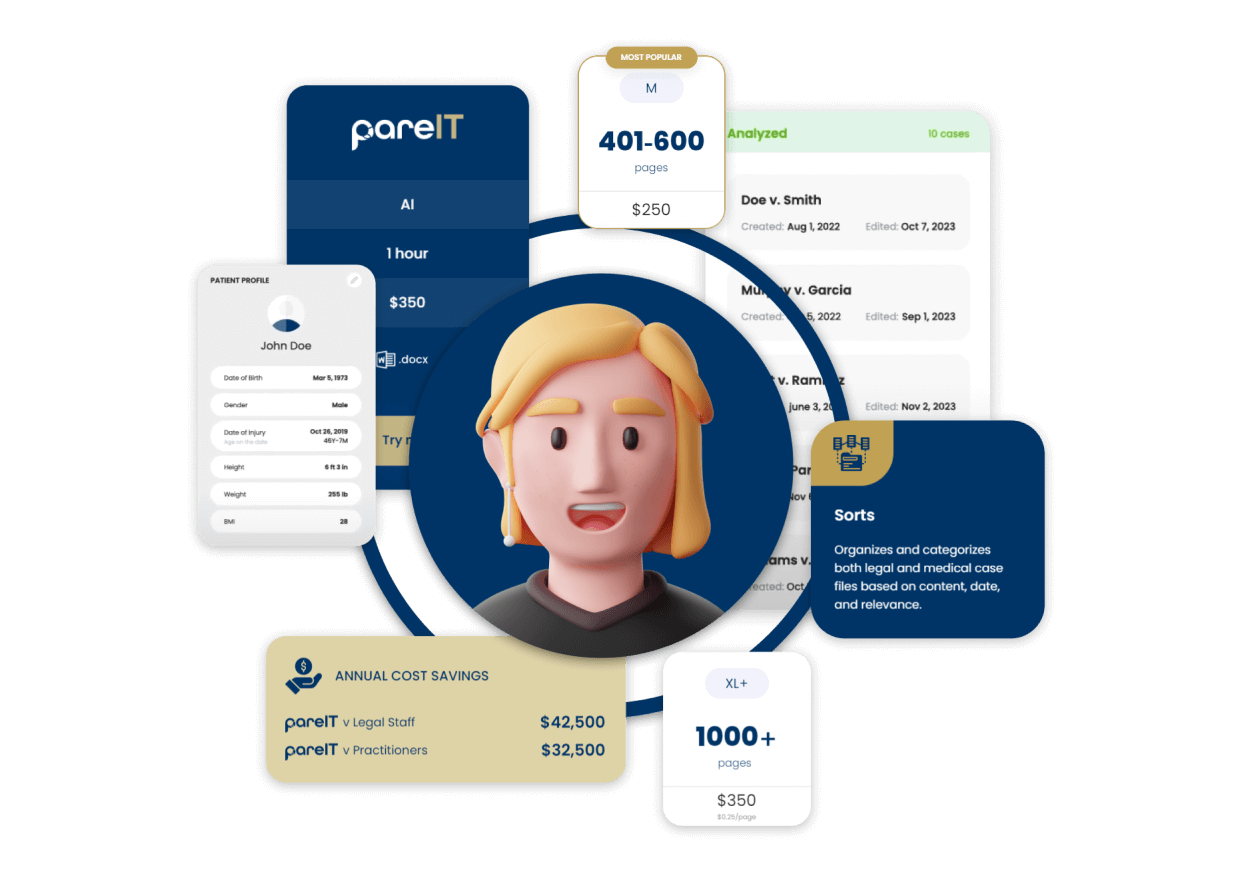
Riseapps partnered with PareIT and revolutionized medical data summarization for medicolegal teams. The AI-powered summarization reduced turnaround time by 40x, offered greater accuracy in document analysis, and minimized clinical errors. PareIT achieved 85% accuracy and greatly improved efficiency and reliability.
7. Automated Administrative Tasks
By automating documentation and administrative tasks, GenAI frees clinicians to focus on patient care.
AI tools can transcribe and summarize medical appointments, draft messages, and organize information efficiently, potentially increasing billing accuracy and reducing clinician burnout.
Nuance (now Microsoft Cloud for Healthcare) uses AI-powered solutions to boost productivity and precision across all healthcare settings.
With speech recognition technology designed specifically for clinical documentation, Nuance lets healthcare professionals dictate into their EHR systems.
This is a huge time-saver and reduces the documentation burden while ensuring more accurate and consistent patient records.
For example, a hematologist looking at blood smears can describe what they see in real-time and Nuance will transcribe it into the patient’s digital record.
The result is faster, more accurate reporting so physicians can focus on patient care.
Riseapps enabled GenAI automation for one of our clients extensively to enable:
- seamless patient scheduling,
- automated follow-ups,
- smart patient messaging.
HIPAA-compliant chat bots and AI-powered patient interactions reduced clinicians’ administrative overhead by 40% and allowed physicians to spend more quality time with patients.
5 Most Popular Use Cases of Generative AI for Healthcare
Here are 5 of the most powerful and widely used applications of Generative AI in healthcare:
1. Intelligent Clinical Documentation and Automated Medical Scribing
Clinical documentation takes up a lot of time for healthcare providers, leading to burnout and errors.
Generative AI simplifies this workload, capturing and documenting patient encounters in real-time.
Solutions like Abridge AI and Suki use advanced Natural Language Processing (NLP) and generative AI models to turn physician-patient conversations into concise, accurate clinical notes.
This automates the time-consuming task, allowing clinicians to focus more on patient care and reducing documentation errors.
Key Benefits:
- Real-time automated medical note generation
- Accurate transcription of clinician-patient conversations
- Seamless EHR integration and structured data entry
- Advanced NLP capabilities specialized for medical terminology
- Enhanced accuracy, consistency, and completeness of patient records
2. Enhanced Medical Imaging and Radiology Interpretation
Medical imaging requires precision and clarity for diagnosis. Generative AI enhances MRI, CT, and X-ray images, reduces noise, improves resolution, and even highlights abnormalities that need clinician attention.
Companies like Subtle Medical use generative neural networks to produce high-quality images at lower radiation exposure.
Key Benefits:
- High-quality image enhancement and noise reduction
- Automated detection and highlighting of abnormalities
- Reduced radiation exposure through AI-optimized scanning
- Improved accuracy, clarity, and consistency in image interpretation
- Accelerated diagnostic workflow for radiologists
- Seamless integration into existing imaging software and PACS
3. Accelerated Drug Discovery through AI-Enabled Molecular Design
Drug discovery takes years, if not decades, and is capital-intensive. Generative AI speeds up pharmaceutical R&D by intelligently designing and screening novel drug molecules.
Platforms like Insilico Medicine use generative AI algorithms to create promising drug candidates for rare diseases or complex medical conditions.
This faster and more streamlined approach dramatically shortens the research-to-patient timeline and can change care for millions suffering from underserved medical conditions.
Key Benefits:
- Rapid generation of novel drug candidates
- Predictive modeling of molecular effectiveness and safety
- Accelerated screening and optimization of drug compounds
- Cost-effective identification of potential drug therapies
- Tailored therapeutic discovery for complex and rare diseases
- Seamless integration with pharmaceutical R&D workflows
4. Personalized Care Planning and Predictive Analytics
Healthcare is moving away from broad-brush, one-size-fits-all treatment plans to highly personalized patient recommendations.
Generative AI can analyze patient data like medical history and genetic profiles to provide highly accurate individualized treatment recommendations.
For example, AI-driven platforms can predict hospitalization risks, identify chronic illnesses earlier, and generate personalized intervention plans that improve preventive care. Companies like
Healx and Deep Genomics show how AI can provide unprecedented personalization and precision in patient therapeutics and interventions.
Key Features:
- Customized treatment recommendations based on patient profiles
- Dynamic patient risk prediction and early intervention
- Enhanced accuracy in predicting patient health outcomes
- Proactive management of chronic and complex conditions
- Real-time care plan updates as patient circumstances evolve
- Improved patient adherence through tailored health guidance
5. Conversational AI-Powered Virtual Medical Assistants
AI-powered virtual medical assistants, enabled by advanced generative algorithms, guide patients through:
- initial healthcare interactions,
- symptom evaluations,
- medication queries
- routine preventive healthcare appointments.
Intelligent AI chatbot services like Ada Health use generative AI to accurately analyze patient-reported symptoms and provide timely assessments and triage recommendations.
Key Benefits:
- 24/7 automated patient communication and symptom assessment
- Natural, human-like interaction capabilities
- Intelligent triage guidance and healthcare referrals
- Personalized responses based on the patient’s medical history
- Appointment scheduling, reminders, and routine query handling
- Integration with patient portals, telemedicine platforms, and EHR systems
- Improved patient engagement, accessibility, and satisfaction
6 Real-Life Examples of Generative AI Applications Tailored for Healthcare
Here are six products currently delivering value with generative AI:
Epic on Microsoft Azure
Epic’s collaboration with Microsoft Azure uses generative AI models to secure patient messaging and automate clinical documentation.
The platform writes physician notes, freeing clinicians from administrative tasks and allowing for more comprehensive and personalized patient consultations. This integration also provides real-time AI-driven recommendations for clinical follow-ups and preventive care.
Oracle Cerner Clinical Digital Assistant
Oracle Cerner’s generative AI solution automates clinical note-taking and patient summaries during medical encounters.
Using advanced natural language processing and AI algorithms, this platform translates doctor-patient conversations into structured, ready-to-use Electronic Health Records (EHR) content, resulting in reduced administrative workload and more physician time for direct patient care.
Ada Health Intelligent Symptom-Checking App
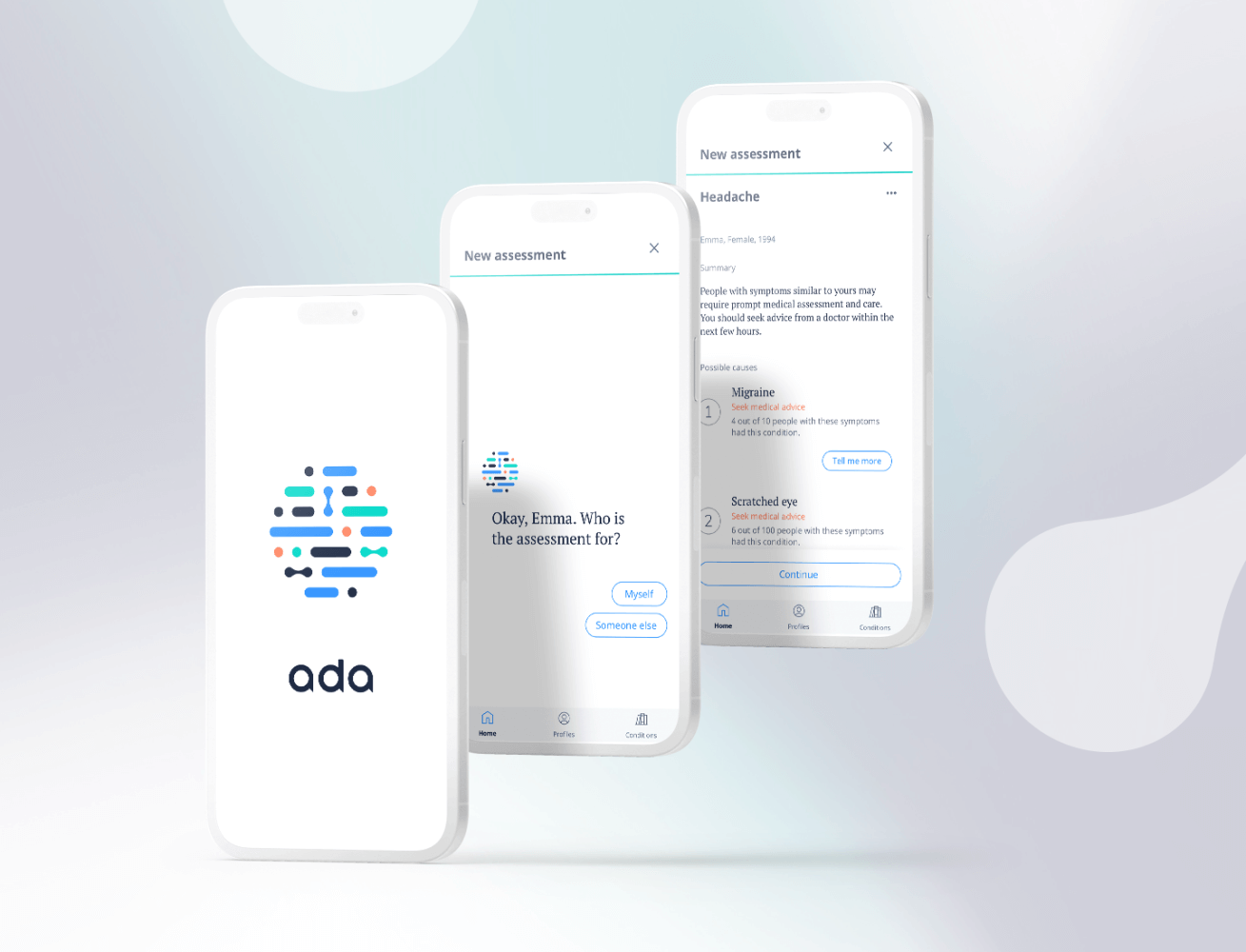
Ada Health uses sophisticated generative AI algorithms to deliver patients personalized medical assessments and health recommendations.
By interpreting user symptoms and medical history, the app offers clear guidance on potential health issues, next steps, and specialist referrals.
PathAI Diagnostic Assistance
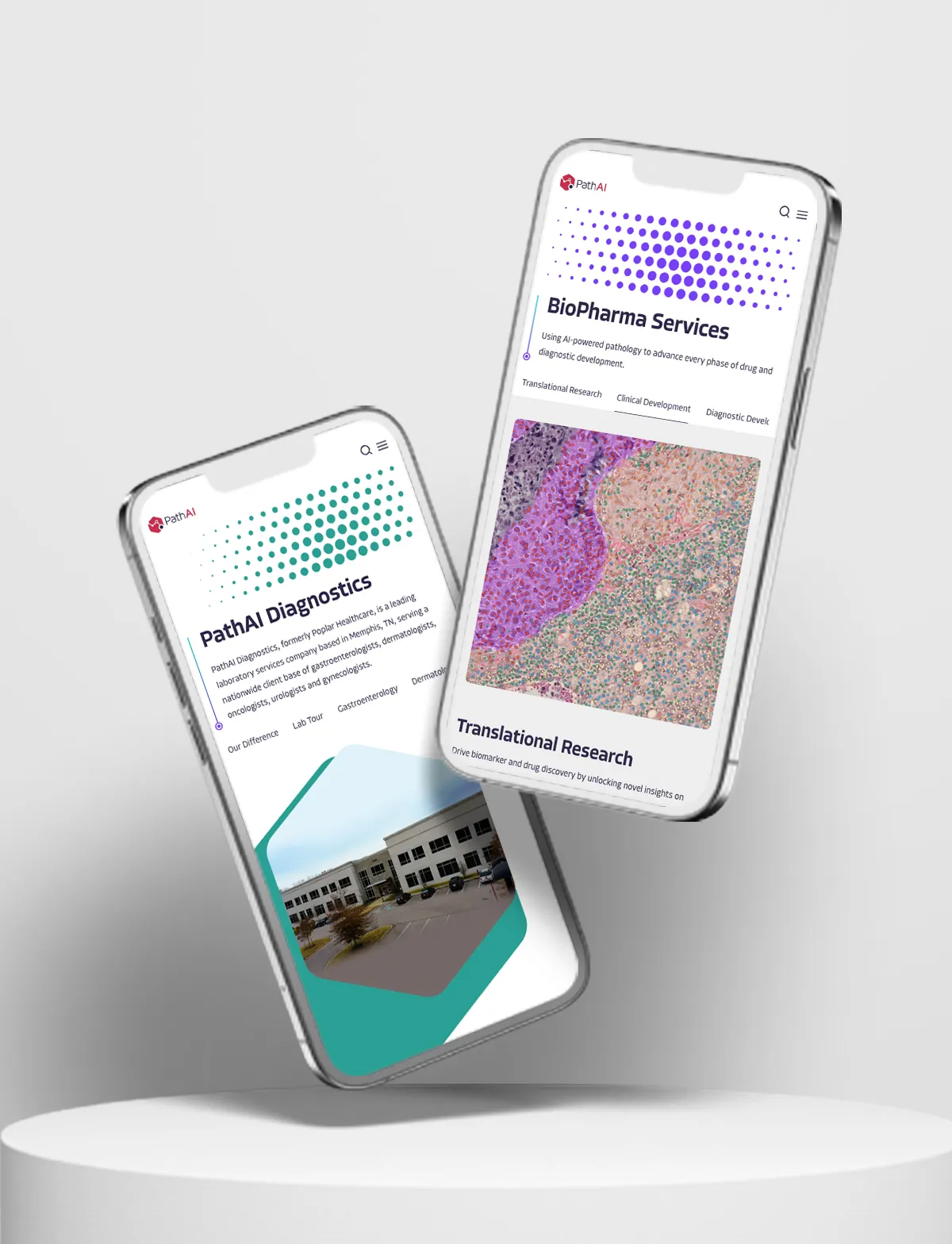
PathAI develops diagnostic assistance tools using generative imaging algorithms trained on millions of pathology data points.
The AI technology quickly and accurately identifies cancer and other critical diseases, outperforming traditional manual review processes.
PathAI’s solution improves diagnostic consistency, speed, and accuracy, resulting in faster, more reliable patient diagnosis and targeted care delivery.
Insilico Medicine’s Rapid Drug Discovery Platform
Insilico Medicine developed Pharma.ai to help pharmaceutical businesses create promising new drug candidates in weeks, not years.
Its proprietary AI software models and tests molecular structures, speeding up pharmaceutical R&D, especially in rare or orphan diseases that are too expensive or complex to develop.
This results in faster timelines, lower costs, and quicker patient access to life-saving treatments.
Black Doctor 24/7 AI-Powered Telehealth Platform
Riseapps partnered with renowned podiatric surgeon Dr. Bill Releford to launch Black Doctor 24/7, a generative AI driven healthcare platform for underserved African-American communities.
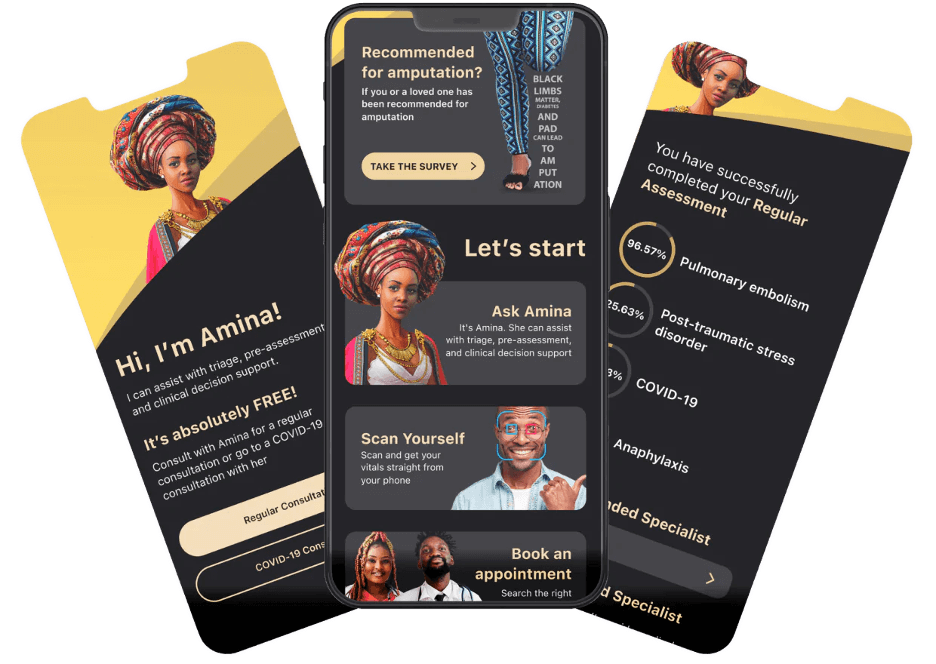
At its core is “Amina” a clinically tested virtual AI assistant powered by Infermedica’s health assessment engine.
Amina AI assistant provides intelligent symptom triage, guiding patients through initial healthcare interactions and speeding up the diagnostic process by 65%.
By automating answers to common patient questions and concerns AI-driven chat bot reduces administrative workload and lets clinicians focus on complex or critical cases.

Integrated into the telemedicine app this feature rich AI solution includes HIPAA compliant secure messaging, real-time telehealth appointments via Agora integration and advanced automated clinical workflows reducing operational overhead by 40%.
The AI-assisted infrastructure has already served over 30,000 patients in chronic disease screening (hypertension, diabetes) and has improved proactive care engagement and access in healthcare underserved communities.
On top of this, we offer our own white-label AI Voice Assistant (“Voice.AI”) for healthcare providers.

Our Voice.AI solution has the following features:
- real-time transcriptions,
- scenario-based healthcare conversation flows,
- EMR integrations (Epic, Cerner, AthenaHealth),
- Support for multiple AI models.
- With them it can quickly enhance patient communications and automate routine interactions.
7 Generative AI Healthcare Startups Changing the Face of Medicine
Across healthcare, startups using generative AI are transforming patient care, driving innovation through intelligent tools and personalized therapeutics. Here are seven exciting ones to watch:
1. Healx: Treatments for Rare Diseases
Healx shows the power of generative AI in addressing previously neglected medical conditions.
Focused on rare and orphan diseases, it uses state-of-the-art generative AI algorithms and machine learning models to rapidly discover and evaluate new treatment candidates from massive biomedical datasets.
Healx’s AI-enabled approach shortens the path from research to clinical trial. Their platform has enormous potential to change the lives of millions of people affected by rare diseases.
2. Subtle Medical: AI Enhanced Radiology
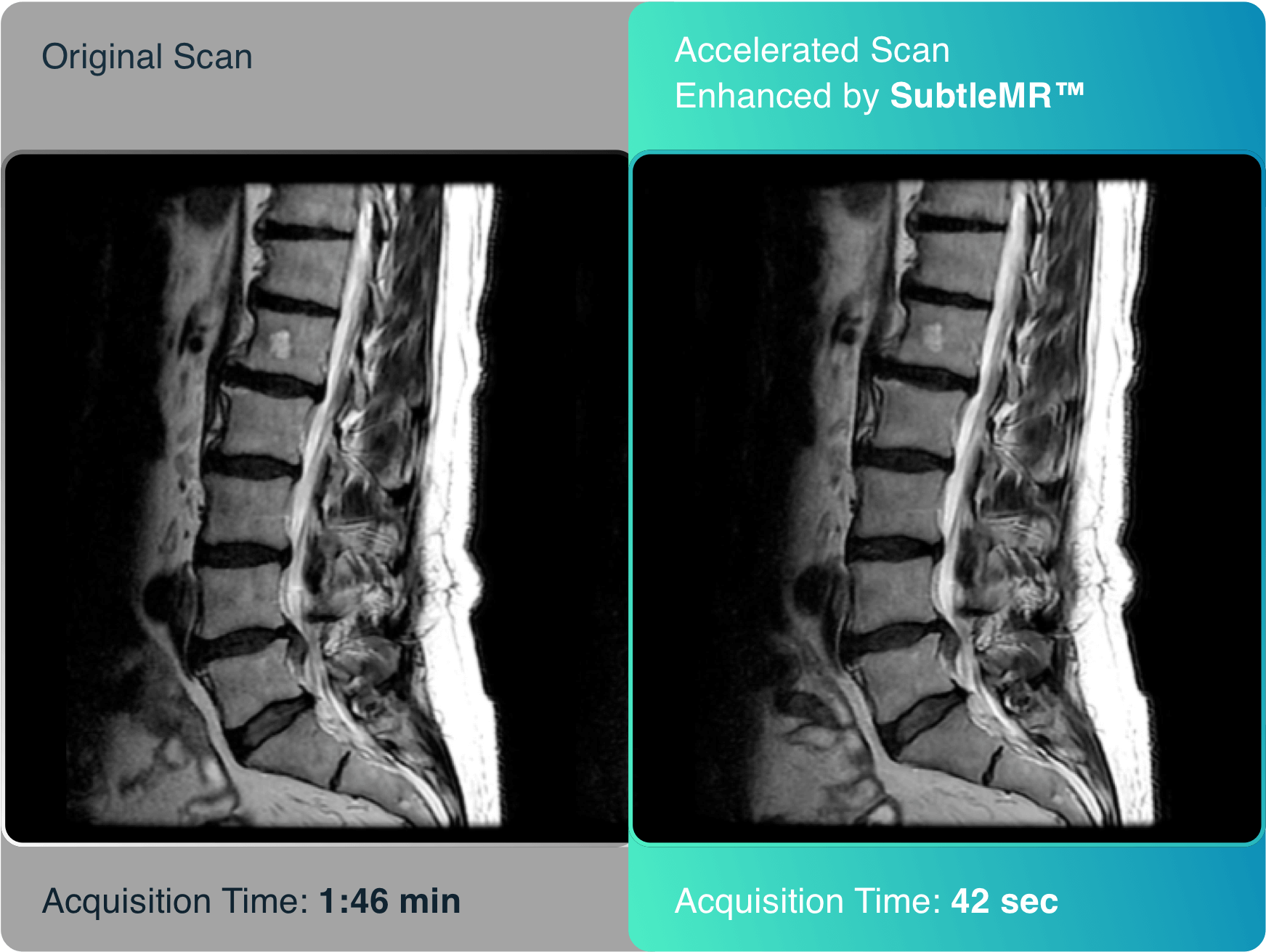
Subtle Medical is a startup making waves by applying generative AI to medical imaging, specifically radiology.
Their proprietary AI-powered software processes MRI and CT scan data, using advanced generative algorithms to improve image clarity, enhance diagnostic accuracy, and reduce radiation dose by up to 60%.
The cool thing about Subtle Medical’s technology is that it can boost image quality substantially, giving radiologists precise diagnostic details even from scans taken under less than ideal conditions.
3. VideaHealth: Predictive AI for Proactive Oral Healthcare
VideaHealth is at the intersection of generative AI and dental healthcare, creating tools to detect, predict, and manage oral disease. Their generative AI-driven software analyzes vast amounts of dental imaging data. It uses predictive analytics to detect issues like cavities, periodontal disease, and oral cancer earlier and more accurately than traditional methods.
By empowering dentists and oral surgeons with accurate assessments of patients’ oral health conditions at the earliest stages, VideaHealth improves clinical outcomes, reduces treatment costs, and patient engagement in dental healthcare.
4. Deep Genomics: Precision Medicine with Generative AI
Deep Genomics is changing how we treat genetic diseases, using generative AI to decode complex biological data and design personalized therapeutics.
Their platform uses advanced generative algorithms to:
- analyze genetic information down to the molecular level,
- predict how genomic variations translate into biological outcomes for individual patients,
- rapidly generate targeted therapies customized at the DNA level.
This precision medicine approach opens up new treatment possibilities in healthcare industry. It enables targeted interventions tailored to individual genetic profiles, minimizing side effects of more general therapies.
5. Abridge AI: Intelligent Summarization for Doctor-Patient Engagement
Abridge AI is tackling some of the biggest issues in healthcare, such as clinician burnout and patient adherence, through generative AI-driven conversational summarization and documentation.
By cleverly using generative AI in healthcare to transcribe doctor-patient conversations, Abridge AI automatically generates clear and concise post-visit summaries, highlighting patient instructions, insights, and care plans.
This technology streamlines administrative tasks, reducing clinician workload by 75%.
It also increases patient understanding and adherence by delivering easy-to-digest, personalized care summaries, directly improving patient satisfaction and clinical outcomes.
6. Hippocratic AI: Intelligent Healthcare Operations Assistant
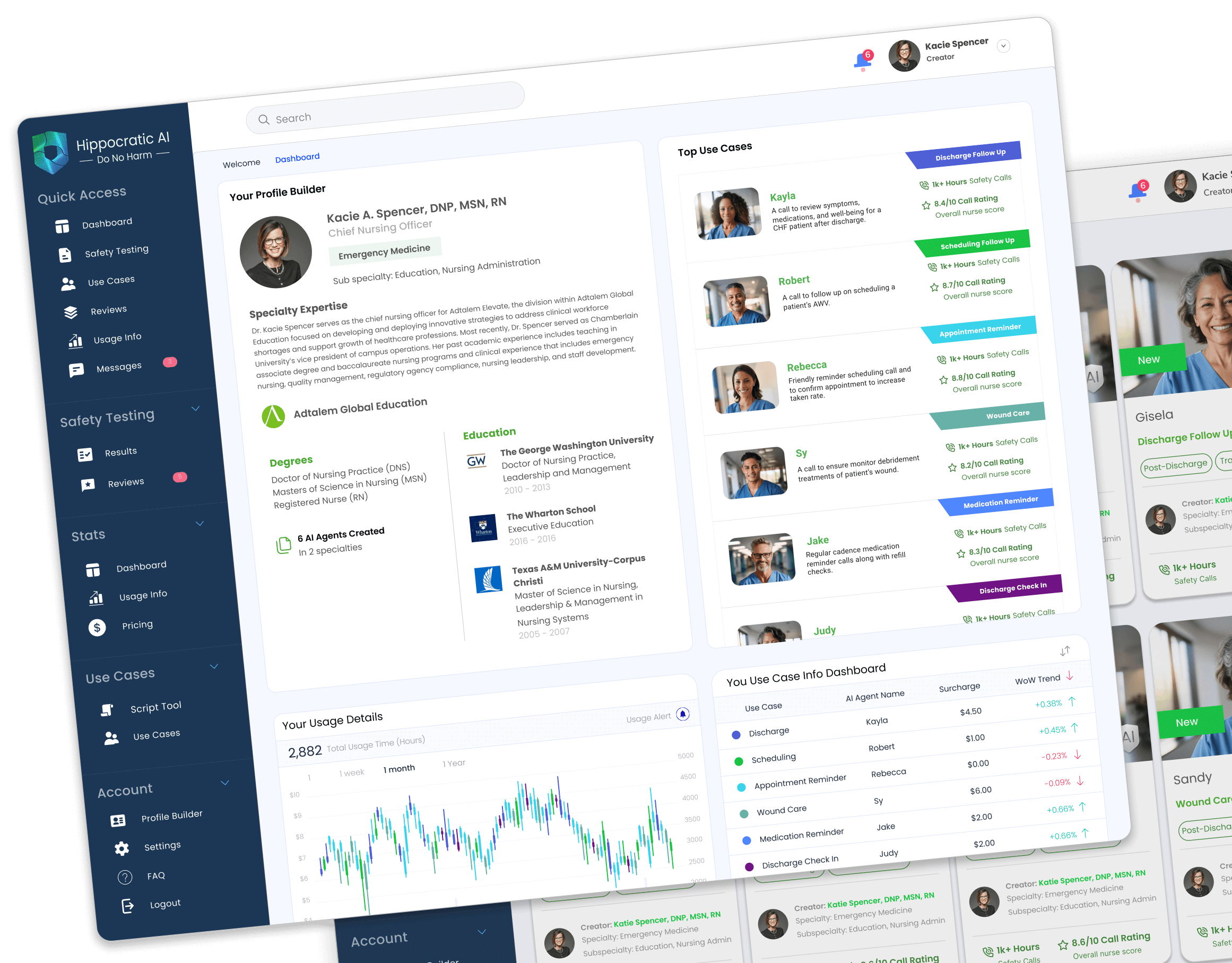
Hippocratic AI focuses on improving operational efficiency through generative AI applications for patient triage, care navigation, and administrative processes.
CB Insights recognized it as one of the top AI companies. Hippocratic AI optimizes administrative tasks so that caregivers can focus more time and attention on patient care delivery.
7. Cera Care: AI for Predictive Home Healthcare
Cera Care uses AI to predict and prevent hospitalizations among older and vulnerable individuals, analyzing home visit data to identify health risks early.
Serving over 30 million people across the UK and Germany, Cera’s AI tools have reduced hospitalizations by up to 70% and are used in approximately 2 million home healthcare visits per month.
These are just a few examples of generative AI in action across healthcare. Interested in learning more about these or other applications? Ask us!
Ready-Made Generative AI Solutions vs. Custom Development
As healthcare organizations consider generative AI, one big question arises: Should they use commercially available, ready-made AI solutions or invest in a custom-built, tailor-made generative AI platform?
Ultimately, this decision will depend on each organization’s unique needs, strategic goals, resources, timelines, and workflows.
Here are the key factors to consider in this AI decision in healthcare:
1. Deployment Cost
Ready-Made Gen AI Solutions
Off-the-shelf, ready-made healthcare generative AI solutions have lower up-front costs and faster time-to-market.
These applications can be implemented quickly without extensive development and are chosen by organizations under budget constraints or timelines. But what seems budget-friendly upfront may have hidden costs down the line.
Budget Gen AI solutions may require costly workarounds, user retraining, or continuous making-do compromises to fit niche healthcare use cases or specialized workflow needs. Those changes eliminate the cost savings initially gained and lead to higher long-term healthcare costs.
Custom-built Gen AI Software
These solutions have a higher initial investment in development and engineering. While that’s more expensive upfront, the long-term returns are much higher.
A custom solution is designed with your organization’s nuances in mind so it fits precisely with no rework or costly compromises later, ultimately improving patient outcomes
2. Integration Capabilities
Ready-made Gen AI Solutions
These tools, powered by large language models, are designed to integrate with widely used software platforms and major Electronic Health Records (EHRs).
However, healthcare providers deal with unique legacy systems, varied EHR architectures, and diverse software integrations for patient management, telemedicine, billing, and more.
Those specialized applications can be a challenge for generic off-the-shelf AI tools, requiring substantial adjustments or manual workarounds.
Custom-built Gen AI Software
Such Gen AI solutions prioritize integration with your existing technology ecosystem from day one.
Custom-built AI healthcare systems integrate seamlessly into complex clinical workflows, legacy healthcare systems, specific regulatory and compliance requirements (like HIPAA or GDPR) and existing IT architecture.
3. Scalability and Flexibility
Ready-made Gen AI Solutions
This software is built with pre-defined features and capabilities to meet healthcare industry standards.
However, as healthcare organizations grow and adapt, clinical procedures evolve, regulatory landscapes shift, patient needs change, and off-the-shelf solutions become increasingly restrictive.
Generic AI models have limited potential for enhancements and require lengthy and costly vendor negotiations or new software replacements.
Custom-Developed Gen AI Systems
They have much more flexibility to scale with growth demands, healthcare industry trends, or unexpected technological advancements.
Built according to your organization’s roadmap and strategic vision, custom solutions can accommodate extensive modifications, continuous improvements, and feature augmentations to stay aligned with evolving regulatory scenarios.
4. Data Ownership and Privacy
Ready-made Gen AI Solutions
Off-the-shelf Gen AI systems, especially cloud-based and externally hosted options, may raise questions about data protection, control, and ownership.
Commercial AI services often impose unclear or disadvantageous terms around data security, ownership of insights, and organizations’ rights to their own clinical data.
Custom-Developed Gen AI Software
This type of tool offers higher levels of confidentiality, rigorous data security practices, and full control over patient information.
Your organization has full governance of data ownership with transparent accountability around compliance protocols.
Data sovereignty is critical for healthcare organizations committed to ethical responsibility, patient trust, regulatory compliance, and long-term digital security.
5. Time-to-Deployment
Ready-made Gen AI Solutions
Generic solutions offer faster deployment and immediate time-to-value for urgent operational needs or pilot projects.
However, faster deployment often sacrifices customization and may limit user adoption and workflow efficiency enhancements, impacting solution sustainability.
Custom-Developed Gen AI Software
Custom Gen AI solutions involve dedicated requirements analysis, development phases, regulatory and compliance considerations, and testing, all of which lead to longer deployment timelines upfront.
Despite those extended implementation periods, the deep alignment achieved through fully tailored AI development often accelerates clinician adoption rates and improves user satisfaction levels in the long run.
To make an informed decision between ready-made, custom development, or a blend of both, healthcare leaders must assess:
- their needs,
- internal resources,
- technical capabilities,
- organizational priorities,
- user and patient requirements.
How Riseapps Can Support Your Generative AI Healthcare Initiatives
When it comes to generative AI in healthcare, Riseapps has no equals. With extensive experience in developing AI-powered solutions for healthcare use cases, Riseapps knows the unique complexities and requirements of the medical industry.
From quickly deploying ready-made generative AI platforms to streamline clinical workflows to building fully custom AI-driven tools for specialized medical processes, we deliver solutions that match your organization’s needs.
Riseapps has been a trusted generative AI development partner since 2016, helping clients raise over $280 million and scale their revenues quickly through custom AI solutions.
We have experience building HIPAA-compliant AI models, integrating generative AI in healthcare platforms, and fine-tuning AI tools for medical use cases to match healthcare standards and regulations.
Riseapps Case Study: Gen AI-Driven Symptom Checking App
Black Doctor 24/7 is a telemedicine app designed to address healthcare disparities by bringing accessible and reliable medical care to the African American community.
Using advanced AI technology, the app connects patients directly to board-certified healthcare professionals through convenient, secure, and effective virtual consultations.
Client Vision and Requirements
The vision behind Black Doctor 24/7 was big and impactful. The founders wanted an app that would simplify virtual medical consultations and incorporate AI while keeping data private and HIPAA compliant.
Their goal was clear: deliver AI-assisted symptom screening, personalized medical guidance, and real-time virtual consultations all within six months.

Challenges We Faced
Building Black Doctor 24/7 required overcoming several complex challenges:
- HIPAA compliance and managing sensitive patient data securely.
- Integrating reliable and accurate AI technology, including automated patient symptom screening and seamless consultation scheduling.
- Meeting the 6-month launch timeline.
- Delivering an engaging and intuitive user experience for users with varying levels of tech comfort and literacy.

Riseapps’ Custom Solutions
We faced these challenges head-on with custom solutions tailored to Black Doctor 24/7’s unique needs:
- Developed secure data handling processes to meet HIPAA regulations, including end-to-end encryption and advanced data storage.
- Built an AI-powered virtual health assistant (“Amina”) to provide real-time patient symptom assessment and streamline access to medical advice.
- Designed a thoughtful, intuitive and culturally sensitive interface for patients of all ages, backgrounds and tech skill levels.
- Maintained open and transparent communication with Black Doctor 24/7 stakeholders and managed complexities to meet the project timeline.

Results Beyond Expectations
With Riseapps’ expertise and deliberate approach, the Black Doctor 24/7 app delivered amazing results:
- Reduced patient wait time by over 65% to get quality care faster.
- Screened over 30,000 people using AI-driven assessments for common chronic conditions.
- Achieved full HIPAA compliance to protect patient data and establish privacy controls.
Riseapps Case Study: AI Dementia Care Platform
Our client, a US-based healthcare provider specializing in chronic and at-home dementia care, partnered with Riseapps to integrate AI into their existing platform.
They wanted to improve real-time care coordination, personalized patient support, operational efficiency, and caregiver effectiveness while maintaining HIPAA compliance.
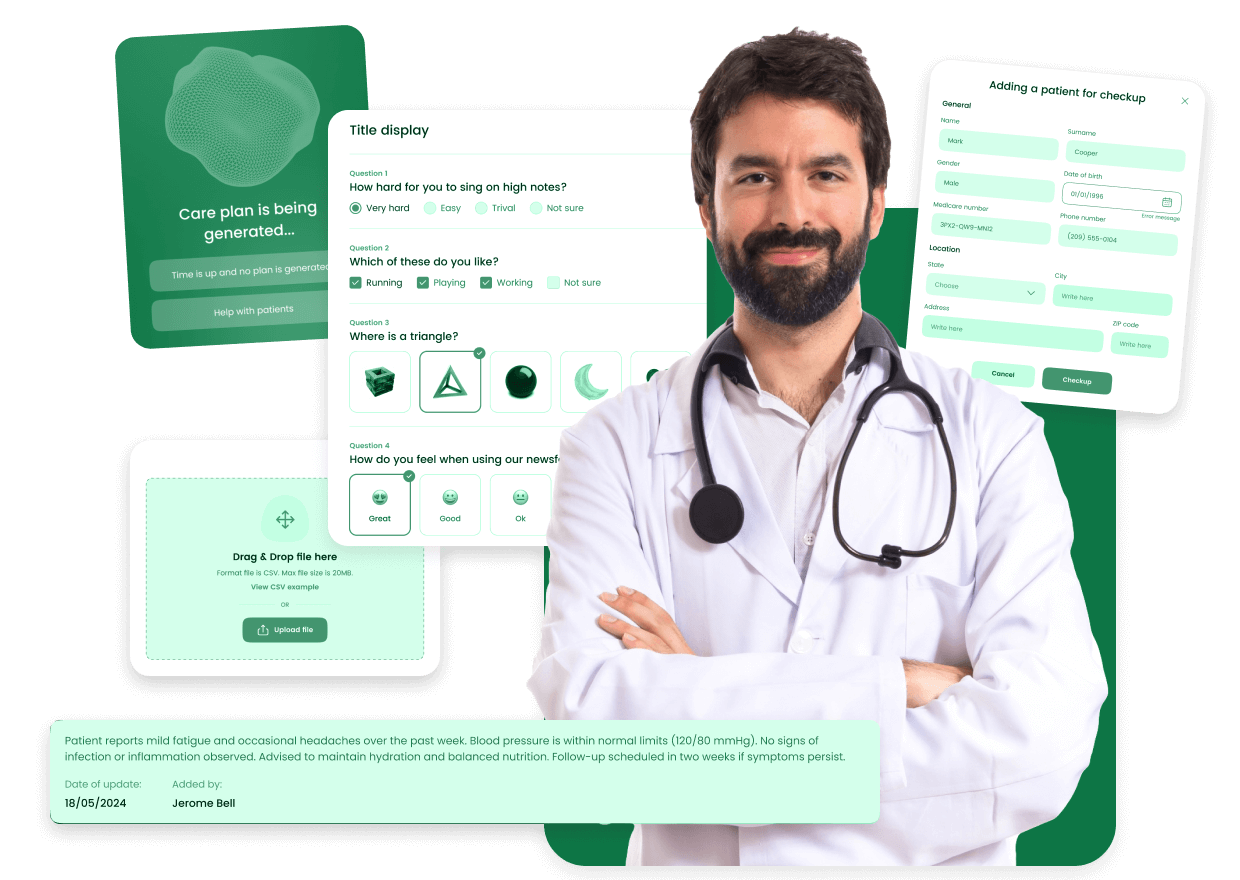
Project Challenges
- Too much time spent on manual medical documentation
- Limited personalization in traditional dementia care plans
- Lack of trust and confidence among medical professionals in AI
- High cost and inflexibility of 3rd party integrations
- Time-consuming eligibility verification and resource access
Riseapps’ Solutions
- Personalized AI-Driven Care Plans: Used generative AI (LLMs + RAG) to create highly personalized dementia care recommendations, increase care plan accuracy, and patient engagement.

- AI Ambient Clinical Scribe: Integrated real-time voice transcription (Deepgram) to automate accurate documentation and reduce clinical documentation workload.
- Custom Built, Cost-Effective Infrastructure: Used self-hosted platforms like LiveKit (telemedicine) and OpenSign (eSignature) to reduce operational costs, increase scalability, and ensure HIPAA compliance.
- Intuitive Task and Goal Management Dashboard: Built a centralized, user-friendly platform combining short-term and long-term dementia care tasks to increase proactive care management efficiency.
- Real-time AI Alerting and Predictive Recommendations: Implemented intelligent alerts and AI based predictions to proactively manage critical care events, reduce caregiver burnout.
- Simplified Resource Integration: Streamlined eligibility and resource access by integrating with community resource platforms (Approved Admissions, FindHelp.org).
- 24/7 AI Chatbot Care Support: Provided personalized, round-the-clock digital AI assistants for caregiver and patient support, reducing caregiver stress.
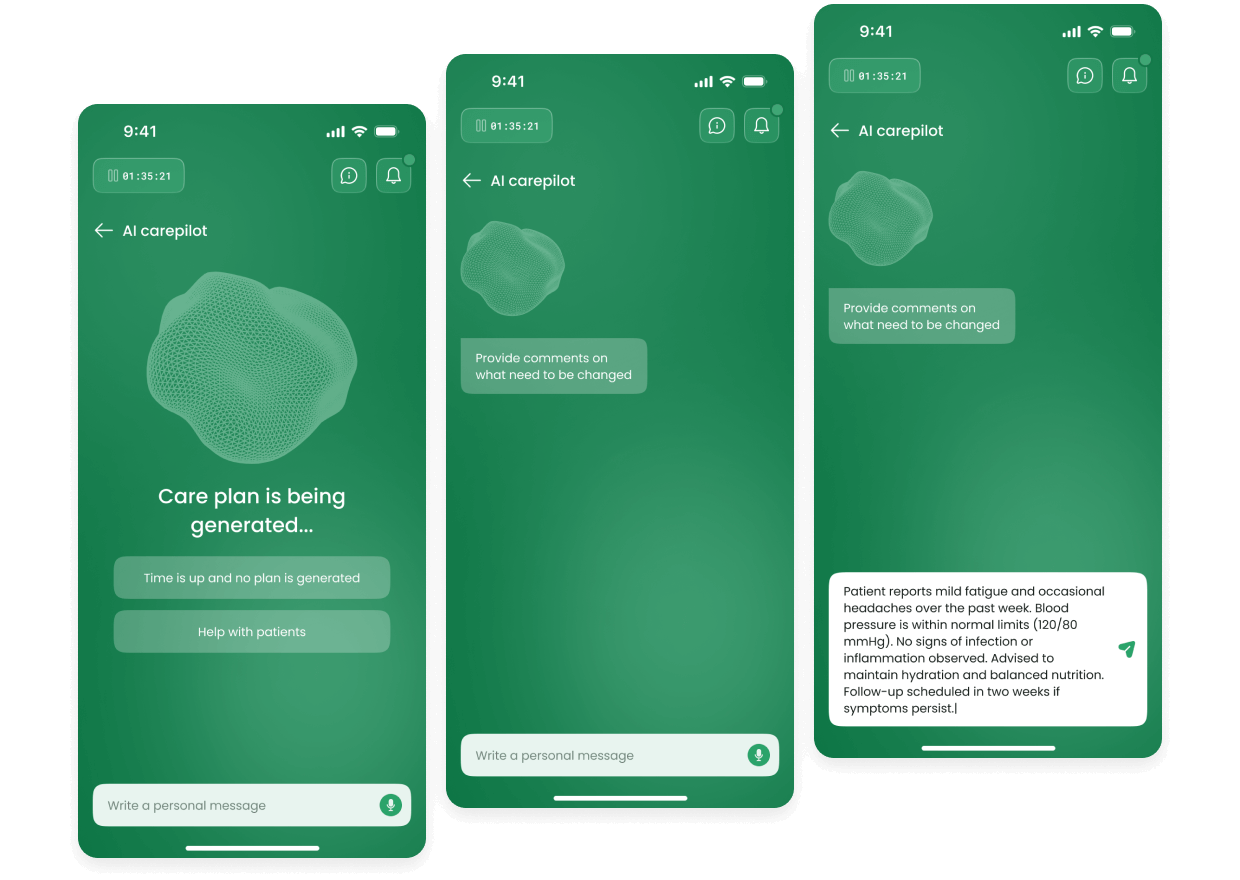
Results Risapps Delivered
- MVP delivered in 5 months
- 50% reduction in clinical documentation time, 35% increase in caregiver efficiency
- 40-60% reduction in operational costs of 3rd party integrations
- 30-40% faster caregiver resource access
- Built-in scalability for future healthcare services integrations (Remote Patient Monitoring, IoT, etc.)
Through AI innovation and design, Riseapps improved patient outcomes, caregiver support, and operational effectiveness, positioning our client as a leader in dementia care delivery.
Here’s how Riseapps can help your healthcare organization with generative AI:
- Custom Generative AI Model Development
We build healthcare-specific generative AI models from scratch, designed for your unique challenges, such as clinical documentation, diagnostic imaging enhancement, predictive analytics, and conversational AI patient interactions.
- AI Model Fine-Tuning for Better Healthcare Outcomes
Our experts fine-tune existing generative AI products to ensure accuracy, precision, and reliability for the healthcare domain.
We increase your solution’s applicability and patient outcomes by fine-tuning models for medical terminology, clinical data, and healthcare workflows.
- Seamless AI Integration into Healthcare Platforms
Riseapps integrates top generative AI technologies (GPT-4 and DALL·E) into your existing Electronic Health Records (EHR), telemedicine software, patient-facing platforms, medical imaging tools, and analytics systems for faster and better healthcare.
- Ongoing Support and Maintenance
Our support doesn’t stop at deployment. Riseapps offers updates, monitoring, scalability, and compliance with changing healthcare regulations for long-term system reliability.
By working with Riseapps, your healthcare organization gets a trusted generative AI expert committed to personalized service, technical innovation, and healthcare value.
We can launch or refine your generative AI healthcare solutions quickly so your organization is at the forefront of medical innovation.
FAQ
How is AI currently used in healthcare?
AI in healthcare is currently used for improving diagnostics through:
- medical imaging,
- streamlining clinical documentation,
- personalizing patient treatments,
- accelerating drug discovery,
- automating administrative tasks,
- predicting health risks proactively,
- enhancing patient interactions with virtual medical assistants.
How big is the GenAI market in healthcare?
The global GenAI market in healthcare is expected to grow from USD 1.96 billion in 2024 to USD 39.68 billion by 2034 at a CAGR of 35.1%. Key growth drivers are better patient outcomes, efficient healthcare operations, and accelerated biomedical research.
What is GenAI for health insurance?
Generative AI is helping insurance professionals to streamline workflows and deliver more personalized customer interactions. AI-powered solutions automate claims handling, improve underwriting accuracy, and offer faster and better customer support with AI-driven chatbots.
What are the cons of generative AI in healthcare?
Generative AI in healthcare has challenges like:
- inaccurate outputs ("hallucinations"),
- data privacy concerns,
- bias from unrepresentative datasets,
- high implementation costs,
- regulatory complexity,
- lack of transparency in decision-making processes.
Contact Us
